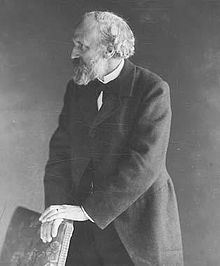Alexandre Ribot
| Alexandre Ribot | |
|---|---|
 |
|
| 46th Prime Minister of France | |
|
In office 20 March 1917 – 12 September 1917 |
|
| Preceded by | Aristide Briand |
| Succeeded by | Paul Painlevé |
|
In office 9 June 1914 – 13 June 1914 |
|
| Preceded by | Gaston Doumergue |
| Succeeded by | René Viviani |
|
In office 26 January 1895 – 1 November 1895 |
|
| Preceded by | Charles Dupuy |
| Succeeded by | Léon Bourgeois |
|
In office 6 December 1892 – 4 April 1893 |
|
| Preceded by | Émile Loubet |
| Succeeded by | Charles Dupuy |
| Personal details | |
| Born | 7 February 1842 Saint-Omer |
| Died | 13 January 1923 (aged 80) Paris |
| Political party | None |
Alexandre-Félix-Joseph Ribot (French pronunciation: [alɛksɑ̃dʁ ʁibo]; 7 February 1842 – 13 January 1923) was a French politician, four times Prime Minister.
Ribot was born in Saint-Omer, Pas-de-Calais. After a brilliant academic career at the University of Paris, where he was lauréat of the faculty of law, he rapidly made his mark at the bar. He was secretary of the conference of advocates and one of the founders of the Sociéte de legislation comparée. During 1875 and 1876 he was successively director of criminal affairs and secretary-general at the ministry of justice.
In 1877 he entered politics, playing a conspicuous part on the committee of legal resistance during the Brogue ministry; in the following year he was returned to the chamber as a moderate republican member for Boulogne, in his native département of Pas-de-Calais.
His impassioned yet reasoned eloquence gave him an influence which was increased by his articles in the Parlement in which he opposed violent measures against the unauthorized congregations. He devoted himself especially to financial questions, and in 1882 was reporter of the budget. He became one of the most prominent republican opponents of the Radical party, distinguishing himself by his attacks on the short-lived Gambetta ministry. He refused to vote the credits demanded by the Ferry cabinet for the Tongking expedition, and helped Georges Clemenceau overthrow the ministry in 1885. At the general election of that year he was a victim of the Republican rout in the Pas-de-Calais, and did not re-enter the chamber till 1887.
After 1889 he sat for Saint-Omer. His fear of the Boulangist movement converted him to the policy of "Republican Concentration," and he entered office in 1890 as foreign minister in the Freycinet cabinet. He had an intimate acquaintance and sympathy with English' institutions,' and two of his published works – an address, Biographie de Lord Erskine (1866), and Etude sur l'acte du 5 avril 1873 pour l'etablissement d'une cour supreme de justice en Angleterre (1874) – deal with English law; he also gave a fresh and highly important direction to French policy by the understanding with Russia, which was declared to the world by the visit of the French fleet to Kronstadt in 1891, and which subsequently ripened into a formal treaty of alliance. He retained his post in Émile Loubet's ministry (February–November 1892), and on its defeat he became president of the council, retaining the direction of foreign affairs. The government resigned in March 1893 over the refusal of the chamber to accept the Senate's amendments to the budget. On the election of Félix Faure as president of the Republic in January 1895, Ribot again became premier and minister of finance. On 10 June he was able to make the first official announcement of a definite alliance with Russia. On 30 October the government was defeated on the question of the Chemin de fer du Sud, and resigned office.
...
Wikipedia
